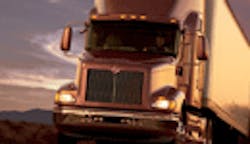Truck and engine maker Navistar is asking the federal government to offer what it calls an “economic exemption” allowing OEMs to continue building 2007 emission-level engines after the 2010 standard goes into effect.
“We’re proposing that the EPA [Environmental Protection Agency] allow manufacturers to keep building 2007 engines alongside the 2010 models – we’re not talking about postponing the 2010 standards here,” Navistar spokesman Roy Wiley told FleetOwner. “We see this as a necessary response to the catastrophic economic situation out there, as a way to help small fleets and owner-operators.”
Wiley noted that Navistar helped sponsor a recent study by NERA Economic Consulting done on behalf of the Owner-Operator Independent Drivers Association (OOIDA), that found the price for Class 8 vehicles meeting the 2010 standard are likely to increase $7,000 to $10,000 per truck. As a result, OOIDA believes the timeline for the federal 2010 emission standards for heavy-duty engines needs to be restructured to prove the worthiness of new engines, give the economy the opportunity to recover, and to let trucks explore fuel alternatives, the lobbying group said.
(Continued)
Navistar’s Wiley stressed that the company is completely confident in its 2010 exhaust gas recirculation (EGR) solution and by no means views its proposal as a way to provide cover for technological shortfalls. “We’re very proud of our 2010 EGR solution – we see no problem with it,” he said. “What we’re trying to do here is help fleets – especially the smaller operators. We need to do something in light of this economic catastrophe; some government action is needed.”
Other truck and engine manufacturers, however, oppose any change in the 2010 rules, which require that all diesel engines built after January 2010 meet the stricter emissions requirements.
“This is the wrong approach, for postponing these mandates sends the wrong signal to the market about the importance of the environment,” Andreas Renschler, head of Daimler Trucks Division, told FleetOwner. “We understand the concern about costs, so what we did in Europe was incentivize the emission issue: offer incentives to buy the cleaner trucks. That does two things--stimulate the economy and clean up the environment. We like it, the customer likes it, and it works.”
Dennis R. Slagle, Mack president & CEO recently commented that “Mack is fully on track with SCR, a proven technology that delivers significantly better fuel economy, benefitting customers and the environment. Moving the goal post now is not necessary and unfair to those who have invested heavily and worked diligently to meet the clean air goals set out by the EPA.”
"Volvo Trucks sees no reason to change the current timetable for US’10,” said Per Carlsson, president & CEO of Volvo Trucks North America. “We’re prepared to meet these regulations as they stand today without the use of emissions credits. Extensive testing in North America and widespread experience elsewhere confirms that SCR is the optimal solution, providing significant fuel economy improvements and cleaner air. More than half a million trucks use SCR every day in Europe. In North America, Volvo Trucks has over 1.5 million miles of customer testing so far, with excellent results and operational experience."
About the Author
Sean Kilcarr
Editor in Chief
Sean Kilcarr is a former longtime FleetOwner senior editor who wrote for the publication from 2000 to 2018. He served as editor-in-chief from 2017 to 2018.
